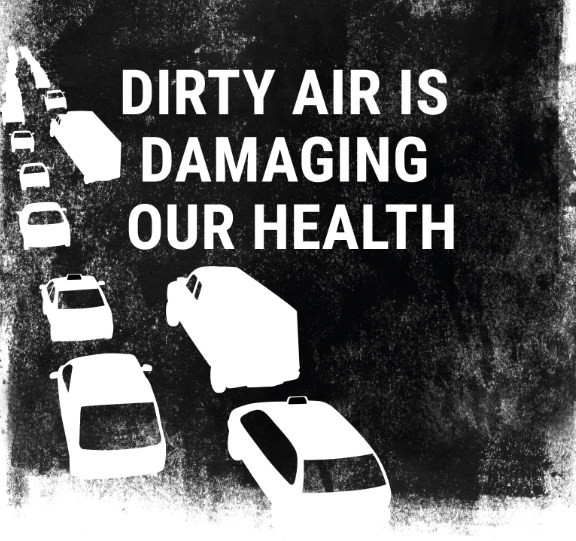Help tackle air pollution on Greater Manchester's roads
Guest User
Many more parts of Greater Manchester have higher levels of air pollution than previously thought, a report published today reveals.
152 stretches of road in Greater Manchester will still be in breach of legal limits for concentrations of harmful nitrogen dioxide (NO2) beyond 2020 unless action is taken.
This new analysis is set out in a report to be considered by Greater Manchester Combined Authority (GMCA) on Friday 26 October setting out progress on the Greater Manchester Clean Air Plan.
Poor air quality is the largest environmental public health issue facing the UK. Road transport causes 80% of NO2 emissions at the roadside, mainly from diesel vehicles.
Pollutants are linked to a wide range of serious health problems, reduced life expectancy, and contribute to the equivalent of 1,200 deaths a year in Greater Manchester alone.
A new Greater Manchester public health campaign and air quality website – www.CleanAirGM.com – will raise awareness of the serious impacts of air pollution and show how residents, businesses and local authorities can work together to tackle it. The website will also give latest details on the development of the Greater Manchester Clean Air Plan.
Last year the Government’s broad-brush national air pollution model identified just 11 locations in Greater Manchester which are expected to contravene NO2 limits beyond 2020.
Detailed local modelling published today has shown the problem not only to be more widespread but also worse, with higher levels of NO2 than expected.
Greater Manchester is one of dozens of areas in the UK instructed by Government to put forward proposals to tackle NO2 air pollution on local roads as soon as possible.
All 10 Greater Manchester councils are developing a single Clean Air Plan to reduce NO2 in close collaboration with Public Health England and the Government’s Joint Air Quality Unit (JAQU).
Transport for Greater Manchester (TfGM) is working closely with the 10 councils to produce the draft plan.
Councillor Alex Ganotis, GMCA Green City Region Lead, said: “Nitrogen dioxide is an invisible killer, and drivers and their passengers often don’t realise that the air inside their car can be dirtier than outside.
“We can all make small changes to help clean up our air. For example, driving less and walking or cycling more can help reduce your exposure to air pollution and also cut emissions. We’re looking at ways to help more people do this.
“But we mustn’t lose sight of the fact this is a looming public health crisis which needs urgent national action. We’re calling on Government to give Greater Manchester the tools we need to tackle the problem together – this means a local vehicle scrappage scheme and funding for cleaner engines for buses and taxis.
“In developing our Clean Air Plan, Greater Manchester is following a strictly defined process set out by Government to run feasibility studies on potential NO2 air pollution compliance measures.
“I want to be clear that a congestion charge is not being considered as part of this process. But we do have to consider how we ensure that dirty vehicles are not polluting our air. This is a major public health problem for Greater Manchester.
“Government must also act to make sure Highways England, which runs the motorway network around Greater Manchester, tackles air pollution on and near our motorways.”
Eleanor Roaf, Greater Manchester’s lead Director of Public Health for air quality, added: “Air pollution is the number one environmental public health issue in Greater Manchester.
“And it’s children, older people and those in poor health who are hit hardest by polluted air.
“But it’s not just them who would benefit from this problem being tackled effectively.
“Polluted air increases the chance of hospital admissions and trips to A&E. It’s harming our health and is linked to increased risk of heart disease and lung cancer.
“That’s why urgent steps need to be taken to ensure this issue is tackled as quickly as possible.”
Possible measures shortlisted by Greater Manchester in March 2018 as part of this process include: increasing public transport capacity; upgrading or retrofitting the public transport fleet to run on cleaner engines; increasing the use of electric vehicles through expanding the electric charging point network or financial incentives; better traffic management; encouraging use of alternative fuels; expanding and improving cycling and walking infrastructure; and potentially introducing Clean Air Zones, where the most polluting vehicles may attract a penalty payment if they are driven into certain designated areas.
Greater Manchester’s preferred package of measures is required by Government to tackle the problem at least as quickly as a charge-based Clean Air Zone could, for the same or lower cost.
No decisions have yet been made about the potential options for tackling air pollution. A further report on options for reducing NO2 levels across Greater Manchester will be considered by Greater Manchester councils and the GMCA in the next couple of months.
